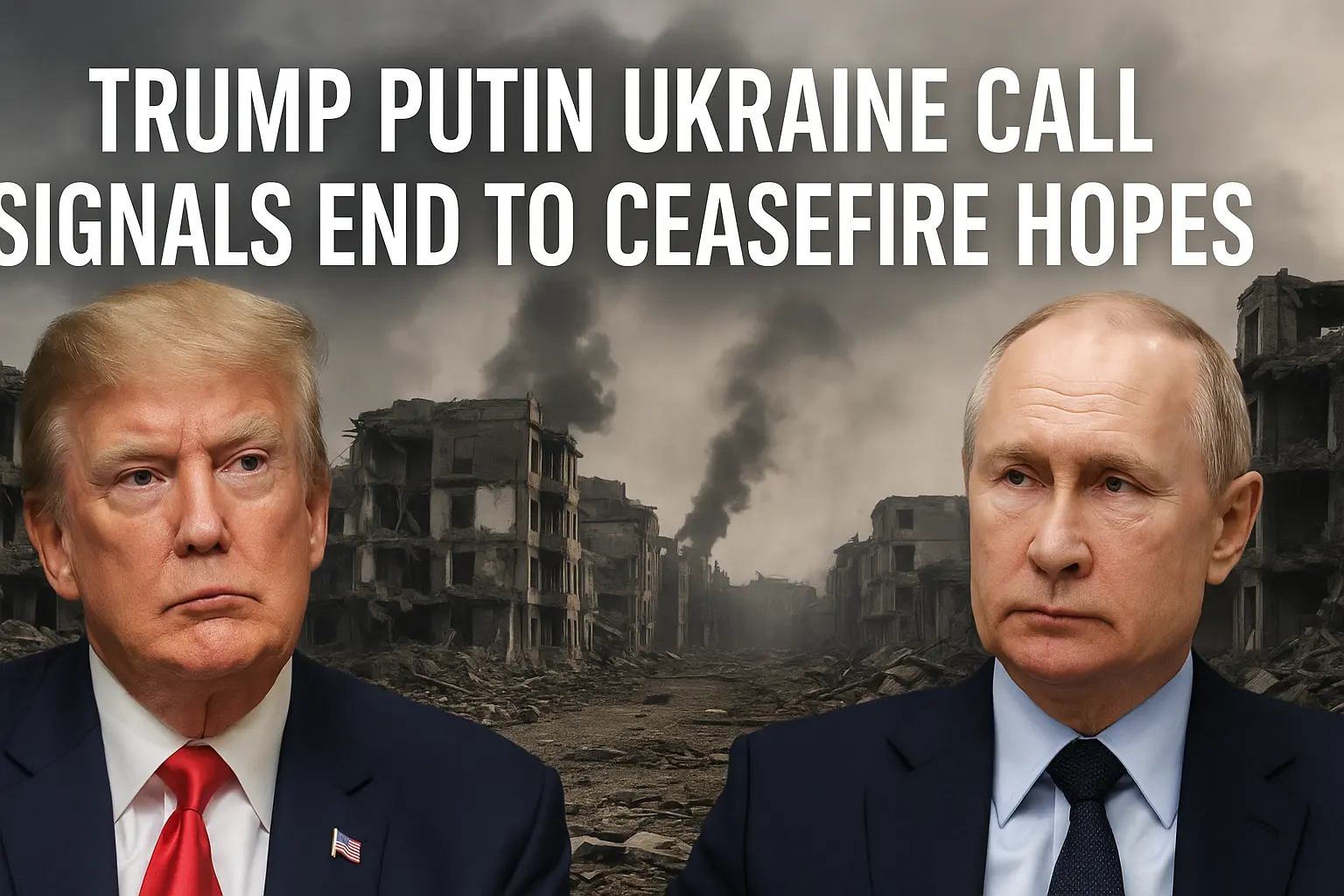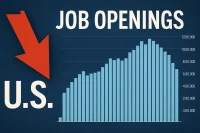Introduction: When diplomatic words become weapons
The recent Trump Putin Ukraine call has sent shockwaves through diplomatic and political circles. Just moments after former President Trump announced to the world that Russia is about to retaliate against Ukraine, a senior Ukrainian official told CNN’s Jim Sciutto that Trump was, quote, “giving a green light to Putin to attack them.” Trump revealed details of his 75-minute phone call with Vladimir Putin in a social media post—one he deleted and reposted an hour later—detailing that the Russian leader told him there is “no chance of a ceasefire” after Ukraine’s devastating strike on the Russian Air Force.
This Trump Putin Ukraine call marks Putin’s first direct (albeit indirect, through Trump) response to the attack, with Trump calling it a “good conversation” and relaying that Putin “very strongly” said he would have to respond to the recent attack on the airfields. Notably, Trump did not condemn Putin’s plans for retaliation, instead calling them a “counterattack.”
Table of Contents
Diplomatic disconnect: The Trump-Putin relationship revealed in the Ukraine call
The Trump Putin Ukraine call highlights a long-standing, complex relationship. Trump’s account of the call showed no attempt to deescalate the situation, instead treating Putin’s response as normal and justified. This lack of condemnation has raised alarms among Ukrainian officials and Western analysts, who see it as tacit approval for Russian aggression.
What happens when Ukraine strikes Russian airfields?
Ukraine’s recent drone strike delivered a stunning blow to the Russian Air Force, obliterating 41 of Putin’s planes on the ground—planes used to bomb civilians in Ukraine. Trump, in his call, referred to Ukraine’s act as an “attack,” and relayed Putin’s view that retaliation was necessary.
Key points from the Trump Putin Ukraine call:
- Ukrainian forces destroyed 41 Russian planes (military targets used to bomb Ukrainian civilians)
- Putin labeled Ukrainian President Zelensky a “terrorist” for the operation
- Trump revealed Putin’s retaliation plans without condemning them
- Ukrainian officials see this as “green-lighting” Russian aggression
From military targets to political fallout: Key reactions to the Trump Putin Ukraine call
Statements that triggered alarm:
- Trump: “Putin did say and very strongly that he will have to respond to the recent attack”
- Ukrainian official: This is “giving a green light to Putin to attack”
- Congressional response: “Vladimir Putin is a vile dictator and thug”
- Putin: Called Zelensky a “terrorist” in a cabinet meeting
- Military experts: Praised Ukraine’s “impressive” tactical achievement
No wonder these developments following the Trump Putin Ukraine call have dominated headlines. Content about the Trump-Putin relationship garners millions of views, with analysts urgently trying to interpret the implications for Ukraine’s defense and global security.
For more expert analysis on the Russia-Ukraine conflict, visit the Atlantic Council’s Ukraine Crisis Hub.
Ukraine vs Russia: The current military balance
| Strategic Element | Ukraine Position | Russian Position |
|---|---|---|
| Air power | Limited, Western support | Significant advantage |
| Long-range strike capability | Growing, demonstrated | Extensive |
| International support | Strong Western backing | Limited to specific allies |
| Economic resources | Strained, dependent on aid | Sanctions-affected but larger |
| Military personnel | Motivated, facing manpower challenges | Larger force, morale issues |
| Territory control | Defending, some recaptured | Occupying eastern regions |
If you’re analyzing the conflict context around the Trump Putin Ukraine call, these factors make or break Ukraine’s defensive position and Russia’s offensive
capabilities.For detailed maps and situation reports, check the Institute for the Study of War’s Ukraine coverage.
Explore Top Jobs on WhatJobs
Looking for new opportunities? Search thousands of jobs on WhatJobs and find your next career move today!
Expert assessment: Soldatov’s insights on Putin’s reaction to the Trump call
Russian investigative journalist Andre Soldatov, author of “Our Dear Friends in Moscow: The Inside Story of a Broken Generation,” provided critical perspective on Putin’s thinking after the Trump Putin Ukraine call:
- Putin believes the Ukrainian attack was a game changer for Russian national security and feels compelled to respond to avoid looking weak.
- He wants to appear tough but avoid provoking a wider conflict, so he seeks to get Trump on his side to help frame the situation his way.
- Putin’s messaging: Labeling Ukraine’s military actions as “terrorism” rather than legitimate defense.
Soldatov also recounted Putin’s infamous response to the Kursk submarine disaster, where Putin’s cold “It sunk” answer and smile shocked Russians and revealed his cynicism.Learn more about Russian politics from the Carnegie Endowment for International Peace.
Congressional response: Calls for stronger action after the Trump Putin Ukraine call
A congressman interviewed stressed the need for concrete responses following the revelations from the Trump Putin Ukraine call: “Vladimir Putin needs to be stopped dead in his tracks. What he has done throughout the course of this three-year war is nothing short of genocide.”The lawmaker called for:
- Enhanced sanctions on Russia
- Secondary sanctions that should have been implemented earlier
- European cessation of Russian gas purchases
- Stronger action from both administration and Congress
While acknowledging the need to end the conflict through negotiation, the congressman emphasized that allowing Ukraine to collapse “would be catastrophic for Europe, for Eastern Europe and the United States and our allies.”Find more about congressional positions on Ukraine at the Congressional Research Service.
Mind the (diplomatic) gap after the Trump Putin Ukraine call
Diplomacy isn’t static—it evolves with crises. And nowhere is this clearer than in the ever-complex, occasionally baffling, but always consequential world of US-Russia relations as demonstrated by the recent Trump Putin Ukraine call.Next time a world leader reveals sensitive details of a diplomatic call, take a moment to consider the context. It might signal cooperation. It might signal complicity. But it will definitely shape international response.
Frequently Asked Questions
What was destroyed in Ukraine’s airfield strike mentioned in the Trump Putin Ukraine call?
Ukraine’s drone strike on Russian airfields destroyed 41 Russian military aircraft used to bomb Ukrainian civilian targets. This operation demonstrates Ukraine’s growing capability to strike military targets deep within Russian territory.
Why did Trump share details of his Trump Putin Ukraine call?
The 75-minute Trump Putin Ukraine call resulted in a social media post that Trump initially deleted and then reposted. The post contained specific details about Putin’s intentions to retaliate against Ukraine, with no attempt to discourage escalation.
How might Russia respond to Ukraine’s attack according to the Trump Putin Ukraine call?
Putin has publicly framed Ukrainian actions as “terrorism” rather than legitimate military operations. According to Soldatov, Putin feels compelled to respond forcefully to avoid appearing weak, but also wants to avoid provoking wider international conflict.
Is this conflict likely to escalate further after the Trump Putin Ukraine call?
The risk of escalation remains significant. The conflict is at a “stalemate,” and continued fighting without resolution increases the danger of Ukrainian collapse. The strategic calculation involves balancing military pressure with diplomatic efforts.




